Extract from The Guardian
Exclusive: British high commissioner Vicki Treadell has met with Angus Taylor and Marise Payne
The British government has privately appealed to senior Coalition ministers – including Angus Taylor and Marise Payne – to develop a more “ambitious” climate policy, amid growing concern Australia is not doing enough to cut emissions.
As the government fends off criticism from Pacific island nations about its climate policies, Guardian Australia can reveal that the UK’s high commissioner to Australia, Vicki Treadell, has met with both ministers since the May election, using the introductory meetings to convey Britain’s view that it wants all countries, including Australia, to increase their climate ambitions.
The UK has prioritised climate action, and last month became the first G7 country to legislate a target of net zero greenhouse gas emissions by 2050. Since 1990, the UK has reduced emissions by more than 40%, while the economy has grown by around 70%.
It is understood the high commissioner’s meeting with Taylor, who is
the government’s emissions reduction minister, took place in early July
and discussed the future of Australia’s energy policy after the
Coalition dumped its proposed national energy guarantee in the dying days of Malcolm Turnbull’s prime ministership.As the government fends off criticism from Pacific island nations about its climate policies, Guardian Australia can reveal that the UK’s high commissioner to Australia, Vicki Treadell, has met with both ministers since the May election, using the introductory meetings to convey Britain’s view that it wants all countries, including Australia, to increase their climate ambitions.
The UK has prioritised climate action, and last month became the first G7 country to legislate a target of net zero greenhouse gas emissions by 2050. Since 1990, the UK has reduced emissions by more than 40%, while the economy has grown by around 70%.
A bilateral meeting between Treadell and Payne, the foreign minister, also raised the need for more ambitious climate action, which has become a key concern of Pacific island nations, some of which face an existential threat from rising sea levels.
The prime minister, Scott Morrison, last week fended off criticism about Australia’s climate position at the Pacific Islands Forum after refusing to endorse a statement that had called for a quicker transition to renewable energy and a pledge to end coal-fired power.
While Australia committed $500m in aid money to help respond to the climate emergency in the region, it has rebuffed calls for bolder emissions reduction targets and not to use carry-over credits to meet its 2030 Paris emissions reduction targets.
Like Australia, the UK is also stepping up its diplomatic activities in the Pacific region, opening new posts in Vanuatu, Samoa and Tonga through what it has termed a Pacific “uplift” program.
A spokesman for the UK high commission in Canberra said the call for more ambitious action on the climate emergency did not just apply to Australia.
“No countries’ targets have been ambitious enough and every country needs to do more, including both the UK and Australia,” the spokesman said.
“The UK government believes we have a moral duty to leave this world in better condition than that which we inherited, which is why we have set ourselves a target of net zero emissions by 2050.”
The intervention comes as the Morrison government faces further international pressure to do more on climate, with the UN hosting a climate summit in New York next month, followed by the annual COP (Conference of the Parties) meeting for the United Nations Framework Convention on Climate Change, which oversees global emissions targets.
The UN secretary general, António Guterres, has asked world leaders to demonstrate at the September summit that they have plans for achieving zero emissions by 2050.
Next year, the annual COP will be held in London, where Australia can be expected to face further pressure from Britain and other signatories to bolster its climate targets.

No comments:
Post a Comment